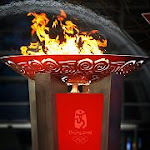
The Dalai Lama has turned into a hot potato in Germany’s icy relations with China. The Tibetan leader’s visit to Berlin ignited significant disharmony between German Chancellor Angela Merkel and her foreign minister.
By STEFAN NICOLA
UPI Germany Correspondent
BERLIN, May 21 (UPI) -- The Dalai Lama has turned into a hot potato in Germany's icy relations with China, and the Tibetan Buddhist leader's latest visit to Berlin demonstrated once again how divided the German government is on the issue.
When the Dalai Lama finally appeared on the stage erected for him in front of the Brandenburg Gate in Berlin Monday, some 25,000 people, many of them waving the Tibetan flag, erupted into cheers and applause. The Tibetan spiritual leader is hugely popular in Germany -- he has been to the country roughly 30 times. His stop in Berlin, a city once famous for its own struggle for freedom, marked the end of his five-day tour through Germany, which had included speeches in sold-out venues in the Ruhr area and in Bavaria.
The visit came roughly eight months after German Chancellor Angela Merkel, of the conservatives, received the Dalai Lama in her office in Berlin; the first official meeting between a chancellor and the Dalai Lama caused a severe diplomatic crisis between China and Germany. The countries' bilateral relationship has only recently begun to recover.
Ever since that first meeting, Germany's grand coalition government (made up of Merkel's conservatives and the Social Democratic Party, or SPD) has disagreed over how to deal with the Tibet question, and the Dalai Lama's latest visit again revealed how disunited Berlin is when it comes to dealing with China.
It is an open secret that Germany's SPD Foreign Minister Frank-Walter Steinmeier disapproved of Merkel's meeting with the Tibetan spiritual leader; he has denied meeting him when he was in Berlin last week. Merkel still is touring Latin America -- a lucky coincidence that is sparing her an awkward decision, observers say.
Chinese diplomats ahead of the visit had warned Berlin not to give the Dalai Lama a platform, and they reacted with furious statements when it surfaced that German Development Minister Heide Wieczorek-Zeul would meet him for an hour Monday in Berlin's posh Adlon Hotel.
Wieczorek-Zeul ignored criticism not only from the Chinese but also from her own party: Steinmeier reportedly was furious over the meeting, one he hadn't been informed about properly.
Merkel backed the meeting, according to her spokesman, who said Monday at his regular news conference: "We do not believe that today's meeting will have a negative impact on the dialogue forming between China and the Dalai Lama's representatives on developments in Tibet and perhaps also in neighboring countries."
Observers have criticized the German government's disunity about the Dalai Lama, arguing it was showing weakness when dealing with China.
"It can't be that one prematurely ducks away, that German policy is to take up a subordinate role, to do what the Chinese government expects and wants," Claudia Roth, the head of the German Green Party, told German news channel n-tv.
The Tibetan spiritual leader is currently in Britain on an 11-day tour, which will be followed by trips to Australia, the United States and France, to call attention to Tibet's struggle.
China has ruled Tibet since it invaded the mountainous region in 1950. The Dalai Lama fled into exile nine years later after a failed uprising against the Chinese. Beijing accuses the Tibetan leader of separatist goals; the Dalai Lama contests he supports autonomy, not independence, for the Buddhist region.
In March, protests in Tibet's capital, Lhasa, turned violent, followed by a brutal police crackdown.
His current stay in London also has been marred by controversy, with British Prime Minister Gordon Brown meeting the Dalai Lama in Lambeth Palace, home of the archbishop of Canterbury, and not in the premier's official 10 Downing St. residence, where Brown's predecessor, Tony Blair, received the Tibetan leader in 1999.
China's growing economic and political importance lures leaders into a "hands off" policy when it comes to Tibet's struggle, critics say.
The Dalai Lama himself seems to be left cold by the quarrel over who will or won't meet him, however.
"Europe's leadership personalities … and the political leadership, like Chancellor Merkel, meet with me, and some leadership personalities feel a bit uncomfortable with that. That's no problem," he told n-tv.
http://www.upi.com/International_Security/Emerging_Threats/Analysis/2008/05/21/analysis_dalai_lama_sparks_row_in_germany/7243/


No comments:
Post a Comment